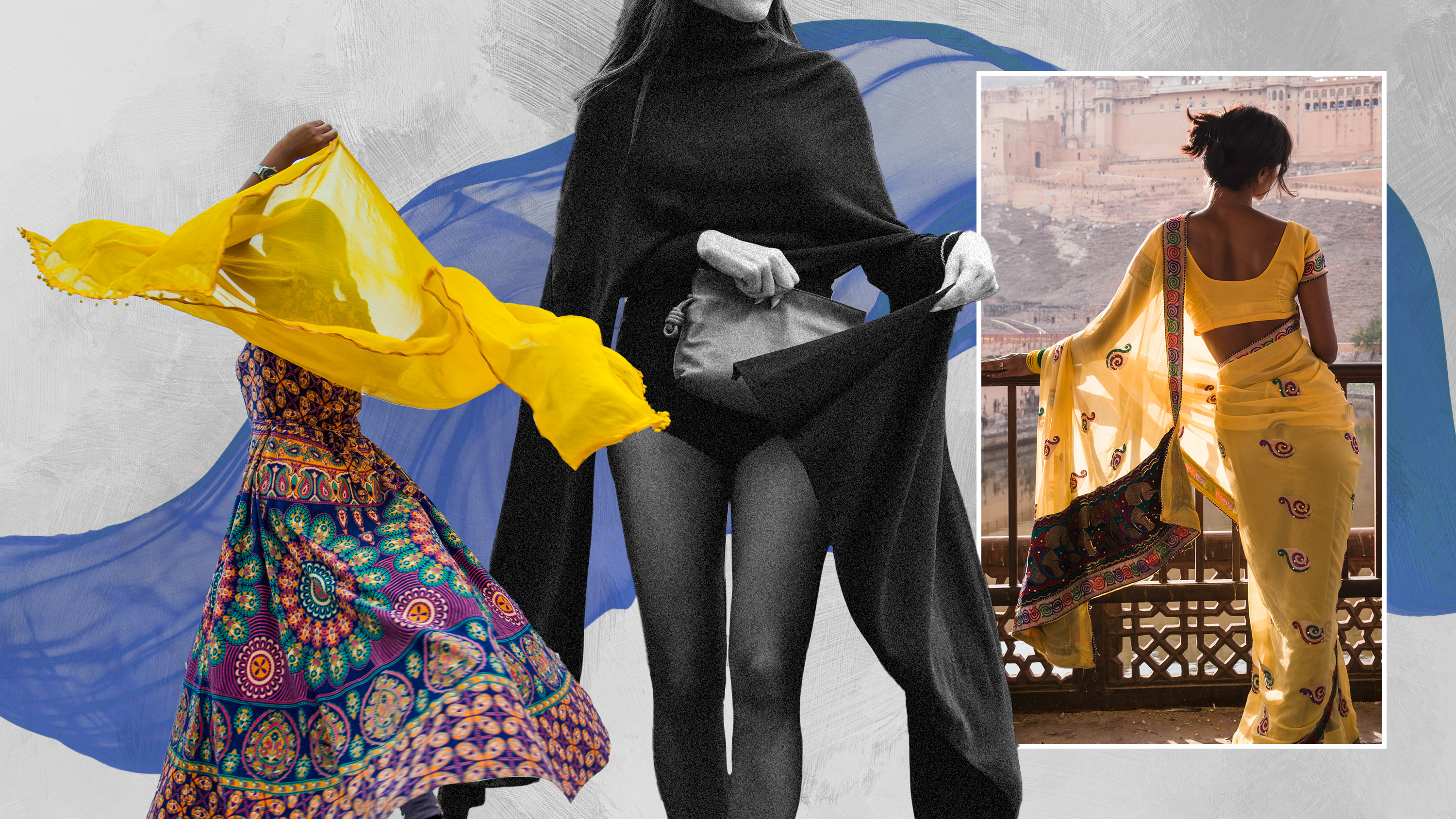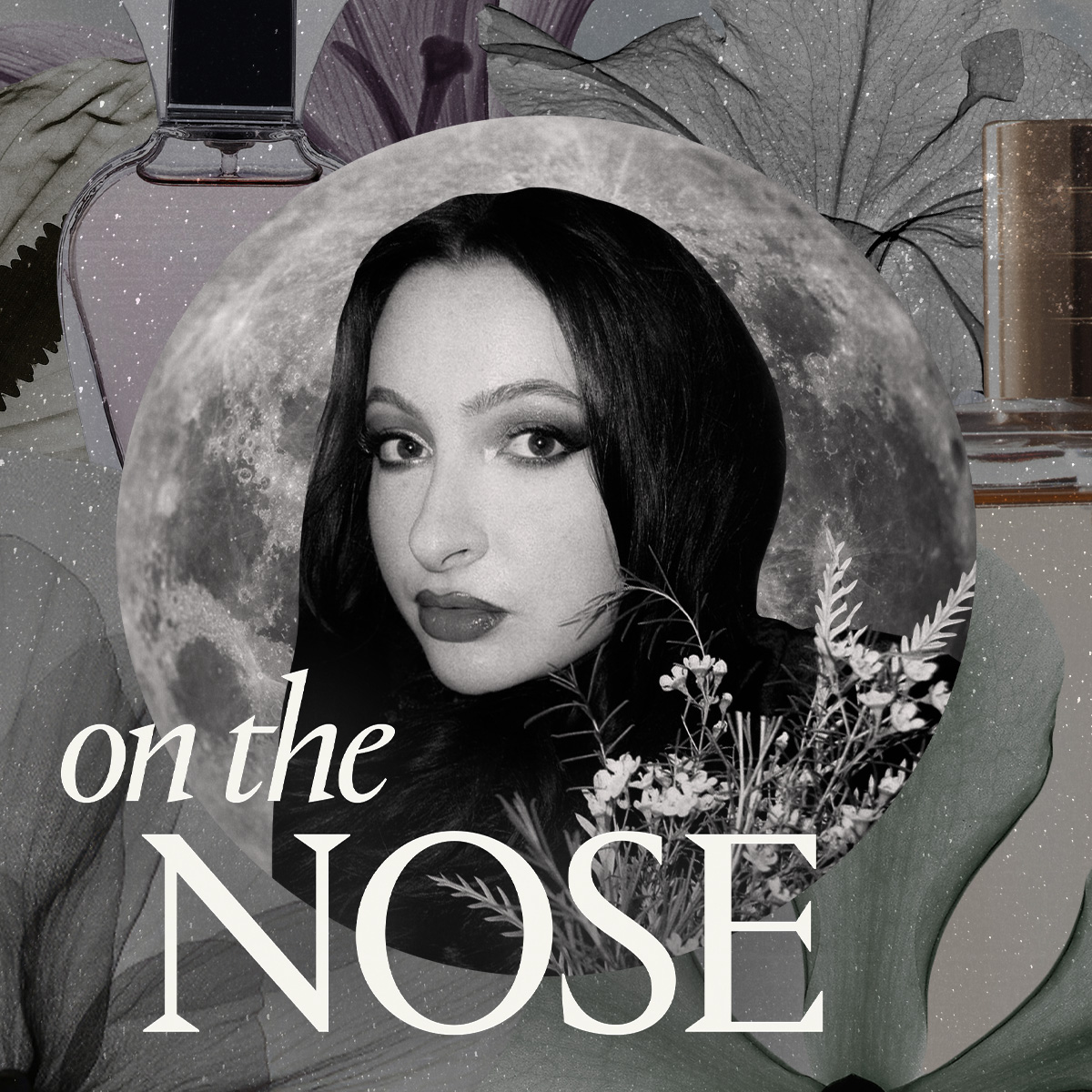Who Is Allowed to Wear the Dupatta Dress?
The viral TikTok video from Bipty's peer-to-peer fashion rental service prompts questions of appropriation versus appreciation.


You’ve probably seen it on TikTok by now: An image of a blonde woman donning a vermilion-colored floor-length dress with a matching sheer shawl scrunched at her neck, the two ends falling gracefully behind her and over both shoulders. In a separate shot, two women are descending a staircase, one sporting a casually open-draped scarf across her chest and shoulders. Then there's another woman's head, hovering over the photos, offering her commentary that the outfits are “very European, very classy” and declaring it to be the perfect “Scandinavian summer wedding guest look.”
Spoiler alert: This lightweight silk shawl isn't even vaguely European. It is called a dupatta, and South Asians and other Eastern cultures have been wearing it as part of their everyday wardrobe for centuries. Also called a chunni, lugda, pothi, odhni, and a variety of other names across the vast subcontinent, the dupatta is a staple that is most often paired with the casual salwar kameez outfit, which looks quite similar to what the women were wearing in the video (which has since been deleted, but not before going viral).
What makes this especially touchy for immigrants and the Southeast Asian community —especially those my age, who were kids of the ‘90s and early aughts—is that many of us grew up bullied for our heritage.
Understandably, Desi women—which include people who have roots in India, Pakistan, Afghanistan, Bangladesh, Bhutan, Maldives, Nepal, and Sri Lanka—took to TikTok to express their astonishment. The Bipty Fashion Rental video—the peer-to-peer rental clothing company that posted the original clip—lives on in the many stitched reaction videos from the diaspora, and the sentiment across them is one that I share: not again.
There's a long history of Western societies “stealing” from the Indian subcontinent and then passing it off as their own. Yoga, an ancient spiritual tradition rooted in the Hindu, Buddhist, and Jain religions and practiced to free the mind to reach enlightenment, is now sold to the masses as a trendy workout. The common yoga greeting “Namaste” has spawned semi-offensive “Nama-stay-in-bed” and “Nama-slay” T-shirts. Bindis, placed between your eyebrows to unlock the third eye, were made popular in the West by Gwen Stefani and is now a staple of Coachella attendees. Starbucks and other coffee shops proudly sell “chai tea,” even though the name is redundant.
What makes this especially touchy for immigrants and the Southeast Asian community—especially those my age, who were kids of the ‘90s and early aughts—is that many of us grew up bullied for our heritage. Our food was smelly, our hair oily, and our clothes weren’t considered stylish. But in 2024, Desi food is popular, putting coconut oil in your hair is trendy, and on TikTok, dupattas are apparently the next fashion statement. It’s not that we don’t want to share these aspects of our culture—it’s that they weren’t deemed acceptable or cool until it was co-opted and marketed by white culture.
While I’m inclined to believe #DupattaGate is a classic case of ignorance, the trend of "borrowing" without explicitly naming the cultural reference point isn’t going away. Emma Roberts recently wore a two-piece bandeau and skirt by Italian designer Giambattista Valli for her Architectural Digest tour that looked eerily similar to a lehenga—but was only recognized and echoed in the post's comments section. Last week, a South Asian creator called out yet another Western brand, VRG GRL, who lifted another traditional style. This time, it was the South Asian jhumka earring, although they attempted to pass it off as a “bohemian luxe” accessory that was in demand by their consumers.
@dear.aneeqa ♬ original sound - dear.aneeqa
Bipty and VRG GRL have apologized, though Bipty turned off comments, signaling they weren’t interested in a constructive conversation. Baymo, the label that manufactures the dupatta dresses, hasn’t acknowledged the situation at all. In response to one creator’s criticisms, VRG GRL claimed to have sourced the jhumkas responsibly, but then feigned ignorance about where the design came from.
Stay In The Know
Get exclusive access to fashion and beauty trends, hot-off-the-press celebrity news, and more.
Where Bipty, Baymo, and VRG GRL fail is in their efforts to financially capitalize on an item and then strip its cultural roots to mass market it. There is a difference between appreciation and appropriation, and the distinction is clear to me: Appreciation acknowledges the origin and pays homage to it, while appropriation acts as though the item at hand is wholly original. Had Bipty researched the dupatta's South Asian origins and concluded the look was “chic,” the reaction may have been entirely different.
There is a difference between appreciation and appropriation...Appreciation acknowledges the origin and pays homage to it, while appropriation acts as though the item at hand is wholly original.
One thing is for sure—Desi fashion is something to be desired, and I’m happy for (and honestly a little jealous of) the young South Asian girls who get to see their culture celebrated in the mainstream and represented by Hollywood's new guard of actresses in movies and television instead of feeling ashamed by it.
Adolescent me, who shied away from wearing her salwar kameez in public non-brown settings, could never have imagined that fashion's A-listers like Zendaya or Gigi Hadid would ever don a sari or that the larger fashion ecosystem would embrace and trust South Asian designers like Prabal Gurung, Manish Malhotra, Gaurav Gupta, and Rahul Mishra to dress the likes of Beyoncé, Selena Gomez, and Michelle Obama.
So, if you’re inclined to wear a lehenga or a dupatta, I’m not asking you not to. Instead, support South Asian fashion labels like holiCHIC or Merakhi or rental houses like Kynah, which have actually done their homework, and remember to give credit where credit is due.

Radhika Menon is a freelance journalist, with a general focus on TV and film. Her cultural criticism, reporting, and commentary can be found on Vulture, ELLE, Teen Vogue, Bustle, and more. You can find her across all socials at @menonrad.
-
 PSA: Your Fragrance Horoscope for Taurus Season Did Not Come to Play
PSA: Your Fragrance Horoscope for Taurus Season Did Not Come to PlayWhether you're cocooning or blooming, your scent is written in the stars.
By Aliza Kelly
-
 The Royal Family Easter Rule Kate Middleton Broke in 2018
The Royal Family Easter Rule Kate Middleton Broke in 2018The Princess of Wales was pregnant with her third child—Prince Louis—at the time.
By Amy Mackelden
-
 Tracee Ellis Ross Reflects on "Grief" Over Not Marrying or Having Kids
Tracee Ellis Ross Reflects on "Grief" Over Not Marrying or Having Kids"I grieve the things that I thought would be and that are not."
By Amy Mackelden